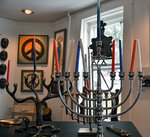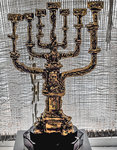 Narrowsburg
NarrowsburgLight Rain Fog/Mist, 43°
Wind: 8.1 mph
 Narrowsburg
Narrowsburg

Is Hanukkah really the Jewish equivalent of Christmas? Growing up in a traditional suburban Jewish household circa 1960, I’m fairly sure that my sister and I both thought so, even though there were some glaring deviations. As my friends visited with Santa and decorated trees with lights and tinsel, I demanded that Mom explain (over and over) why Hanukkah was “no fun at all.”
As a child, I was oblivious to the intricacies of religious doctrine, yet couldn’t help but notice fundamental differences in the holidays. In the spring, my family gathered to honor Passover while my friends celebrated Easter. But at the age of 6, all I knew was that my Gentile (non-Jewish) pals got chocolate bunnies and jellybeans presented in a beautiful basket that they later gleefully filled with brightly colored eggs found hidden amongst the shrubbery dotting their family’s well-manicured suburban lawns.
We got saltwater and a burnt egg bleakly garnished with parsley and horseradish during an hours-long, interminable, never-ending meal. While the rest of the adults sipped glass after glass of disgusting kosher wine, my father slugged scotch and we children ran around the house, hunting for a giant dry cracker wrapped in a napkin, which even the dog didn’t want. But I digress.
Little did I know then that Hanukkah wasn’t much of a holiday at all, and it certainly had nothing to do with gift-giving. I have since learned that “originally, the holiday was intended to parallel the eight-day harvest festival of Sukkot. The Books of the Maccabees made no mention of the legend concerning a small jar of oil that unexpectedly lasted for eight days. Only centuries after the Maccabees’ defeat of the Syrians did the story of the jar of oil—which has come to be associated with Hanukkah—appear in the Talmud” (www.reformedjudaism.org). Hmm.
I also read that “although the practice of lighting the menorah was common throughout much of the 19th century, North American Jews tended to neglect most of the other traditions and practices associated with the holiday.” By the 1920s, however, “Jews increasingly added gift-giving to their Hanukkah celebrations, prompting some people to refer to Hanukkah as the ‘Jewish Christmas.’”
According to the same website, “the elevation of Hanukkah to a major holiday was partly the result of Jews acculturating themselves to a North America that was overwhelmingly Christian in population and symbols. Although Hanukkah had become an important holiday among Jews by the 1920s,” the article informed me, “it would be incorrect to regard it as an imitation of Christmas with an emphasis on the exchange of presents.”
“It’s important to recognize that it is an American Jewish phenomenon, this gift-giving that’s part of Hanukkah,” Rabbi Menachem Creditor, scholar in residence at the UJA-Federation of New York, explained to TIME magazine in 2019. “It’s not historically part of Hanukkah at all. In that, gift-giving on Hanukkah is not unlike gift-giving on Christmas,” he said. “It has little, if anything, to do with the religious requirements of the celebration.”
That sentiment explains the palpable holiday disappointment hanging in the air in the Fox household circa 1960, as we sullenly accepted one gift per night, knowing what was likely to be revealed. The Rabbi’s somewhat terse observation explains a lot, including why so many of our gifts were practical. Disappointing? Sure, especially to a kid who wants to sit on Santa’s lap—but useful, no doubt. “Great,” I’d think, slowly unwrapping something sure to make me sad. “More underwear,” I’d sigh. “Thanks, Mom.”
The way 6-year-old me saw it, my friends excitedly anticipated a magical sleigh brimming with presents delivered by flying reindeer and a jolly old man, while my sister and I recited Hebrew prayers in hushed tones, lighting tiny candles night after night, metaphorically representing a bloody battle and an old oil lamp that may (or may not) have miraculously burned for eight days and eight nights. Big whoop.
Giving presents like socks and tee-shirts, my mother tried to keep it low-key when we were young (“it’s not part of Hanukkah at all”), but over time, she caved as my sister and I incessantly whined (well, I whined anyhow) about not having a tree and being “forced to spin a dumb top.”
I reluctantly looked forward to “Hanukkah Gelt” (tasteless chocolate coins wrapped in golden foil) but still got books and pajamas. As the years passed, Mom would, thankfully, up the ante a little with a coveted Howdy Doody marionette, maybe an Etch-a-Sketch and, by the last night of each Hanukkah, something really cool like a pair of skates and, one year, a bike.
In hindsight, it’s not like we were deprived. Yes, we got gifts, and yes, it went on for a week, but… trust me, it ain’t Christmas. “North American Jews use this holiday as a celebration of family, reinforcing Jewish identity in a place whose population may be overwhelmingly Christian but, in which, Jews feel at home.”
These days, I understand the religious significance of Christmas, of course, but light up when I see tinsel and twinkly lights adorning a beautiful tree. I still get traditional Hanukkah socks and pajamas from friends and family—useful gifts that make me smile. Now that I’m all grown up, practical is good, although I still prefer to pick out my own underwear. And besides, it’s better than a giant dry cracker wrapped in a napkin that even the dog doesn’t want.
Happy Hanukkah.
1 comment on this item Please log in to comment by clicking here
Shain
Thank you Jonathan for the best description of Chanukah and the difference between Chanukah and Christmas that I've come across in forever. You are much appreciated for so much.
Shain Fishman
Sunday, December 18, 2022 Report this